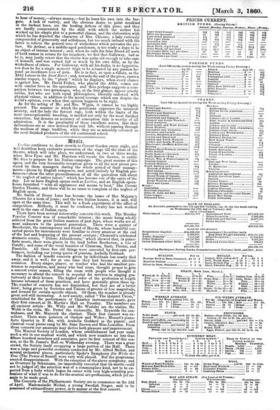1w-line continues to draw crowds to Covent Garden every night,
and will doubtless keep exclusive possession of the stage till the close of the theatre, which will take place, we understand, in two or three weeks, when Miss Pyne and Mr. Harrison will vacate the theatre, to enable Mr. Gye to prepare for his Italian campaign. The great success of this opera and the very favourable reception given to all the new pieces pro- duced by these managers during the whole period of their manage- ments-pieces by English composers, and acted entirely by English per- formers-show the utter groundlessness of all the querulous talk about "the neglect of native talent," which has become one of the cants of the day. Let us have English operas such as .Lurline, and an English opera- house furnished "with all appliances and means to boot," like Covent Garden Theatre, and there will be no cause to complain of the neglect of English opera.
Mr. Smith of Drury Lane has become the lessee of Her Majesty's Theatre for a term of years; and the two Italian houses, it is said, will open at the same time. This will be a fresh experiment of the effect of competition. Hitherto, it must be confessed, rivalry has not worked well in the case of Italian opera.
There have been several noteworthy concerts this week. The Monday Popular Concert was of remarkable interest ; the music being wholly selected from the great Italian masters of past days, whose works are al- most unknown to the present generation. There were a quintet of Boccherini, the contemporary and friend of Haydn, whose beautiful con- certed pieces for instruments were familiar to every amateur at the end of the last and beginning of the present century ; Clementi's celebrated dramatic sonata,' Didone Abbandonata," which showed that, in piano- forte music there were giants in the land before Beethoven; a trio of Corelli ; and some of the vocal beauties of Cimarosa, Sarti, Piccini, and Paesiello. All these fine old things were executed by first-rate per- formers, including our young queen of pianists, Arabella Goddard. The fashion of benefit concerts given by individuals has nearly died away, and it is well; for at one time they had become an absolute nuisance. Every singer, player, or teacher who had the smallest pre- tension to reputation, and many who had none, thought proper, to give a concert every season, filling the room with people who thought it necessary to attend the concert in requital for services in singing gra- tuitously at their houses. The higher order of the profession at length became ashamed of these practices, and have generally given them up. Tko number of concerts has not diminished, but they are of a better kind ; being given by Societies and Unions of greater or less magnitude, and formed for certain specific objects. Of these, the number is already great and still increasing. A new society, called "The Quintet Union,' established for the performance of Chamber instrumental music, gave their first concert, at St- Martin's Hall on Tuesday. The members are all eminent artists : Mr. Willy and Mr. Weslake are the violins, Mr. Webb is the viola, Mr. Pettet the violoncello, Mr. Reynolds the con- trabasso, and Mr. Maycock the clarinet. Their first concert was ex sellout. There were quintets of Onslow and Weber ; Mozart's piano- forte Quartet in E fiat, with Arabella Goddard as the pianist ; and classical vocal pieces sung by Mr. Sims Reeves and Miss Lascelles. From these concerts our amateurs may derive both pleasure and improvement. The Musical Society of London, whose establishment last year made such a stir in our musical world, and which now numbers no less than fifteen hundred members and associates' gave its first concert of this sea- son, at the St. James's Hall on Wednesday evening. There was a great crowd, the Society itself occupying a large portion of the Hall. There was a large and powerful orchestra conducted by Mr. Alfred Mellon and several orchestral pieces, With Spohes Symphony Die Wide der Tone (The Power of Sound were very well played. But the programme
created disappointment. the exception of the above symphony, and an Overture by Schumann, (so imperfectly executed that its merits could sot be judged of) the selection was of a commonplace kind, not to be ex- pected from a body which began its career with very high-sounding pro- fessions of what it was to do for the musical art-professions, which yet re- main to be made good. The Concerts of the Philharmonic Society are to commence on the 23d of April. Mademoiselle Michal, a young Swedish Singer, said to be possessed of extraordinary power, is to appear at the first concert.


























 Previous page
Previous page